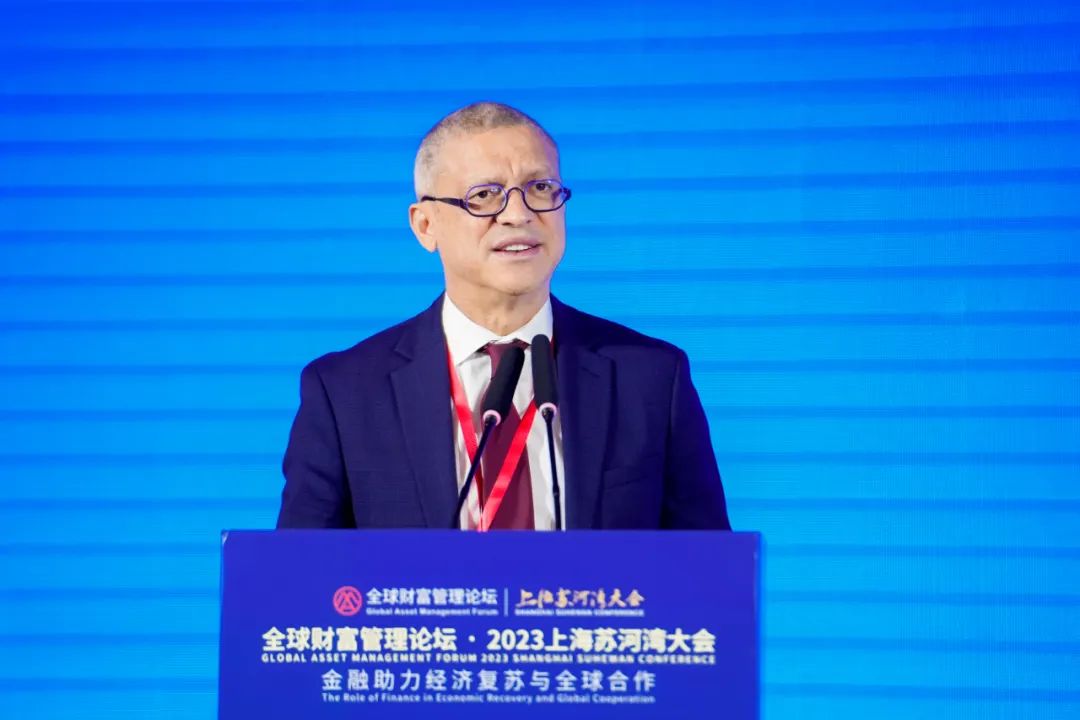新开发银行副行长兼首席财务官Leslie Maasdorp:多边机构如何助力经济复苏与全球合作?
近日,全球财富管理论坛•2023上海苏河湾大会于上海市静安区隆重召开。本次大会以“金融助力经济复苏与全球合作”为主题,广泛邀请政府和金融监管部门、主权财富基金、国际与国内代表性金融机构和知名学者,围绕全球经济金融领域各方共同关心的议题展开深入交流,希望在当前复杂环境下持续增进国际间相互理解、信任与合作。新开发银行副行长兼首席财务官Leslie Maasdorp(马磊立)出席大会并作主题演讲。
Leslie Maasdorp 就多边银行发展、气候变化等问题,分享了以下观点。他认为,一是中国金融业作为多边合作架构中的重要一员,在全球金融复苏和经济合作中发挥了重要作用。二是可持续发展和气候变化已然成为世界银行和大多数多边开发银行的正式职权范围,未来将有越来越多的资源投入气候议程。三是在关注气候变化的同时,也要关注全球公共物品、私营部门发展、人民币国际化发展潜力、多边发展银行的系统运作模式,以及投资组合等议题的转变。四是在人工智能、新技术、大数据和云计算的推动下,更广泛的金融体系正在发生根本性的变化,金融的核心理念也正在发生根本性的变化。他表示,金融体系作为一个整体,不仅需要关注金融的可持续性,还需要处理金融的包容性问题。

尊敬的楼部长,很高兴能与您在全球财富管理论坛再次见面。我很高兴来到这里,代表新开发银行行长迪尔玛·罗塞夫女士向大家致以诚挚的问候。很多人不知道的是,楼部长还担任新开发银行(也就是我们常说的金砖国家银行)的中国理事。新开发银行在2015年还只是一个新设机构,现在已发展成为多边开发银行体系的重要贡献者。新开发银行迄今已批准350亿美元贷款,专门用于成员国的基础设施和可持续基础设施建设。
楼部长在致辞中提到了金融在服务实体经济中的重要作用。我想特别强调一下金融部门的一个分支——多边机构的作用,以及多边主义在服务实体经济中的重要作用。正如我们本次大会的主题——金融助力经济复苏与全球合作。约翰·桑顿在刚才的对话中谈到了历史和背景的重要性。关于多边机构,我不禁回想到1944年,在经历了第二次世界大战的破坏之后,在新罕布什尔州一个叫布雷顿森林的地方设计出了当今世界金融体系的架构,成立了世界银行和国际货币基金组织。从很多方面来看,这些机构的核心构想、核心制度以及商业模式在过去近77年里基本保持不变。
几天前,我刚从摩洛哥马拉喀什回来。很显然,人们普遍认识到,1944年建立的架构现在已与现实脱节。我为什么这么说呢?有下面几个原因。
首先,多边机构非常注重以政府为基础的模式。我们向政府和主权国家提供贷款,而这些贷款受主权担保。众所周知,当今世界面临着一系列跨越国家和地区,以及具有跨国性质的全球性挑战。不仅如此,我们最近经历了全球性的新冠疫情。任何一个国家都无法独立地解决全球性疫情带来的问题。不谋全局者,不足以谋一域。因此,新冠肺炎疫情在很大程度上强化了多边主义的重要性,以及新开发银行、世界银行、欧洲投资银行等全球金融体系重要机构的重要作用。
最近在马拉喀什举行的国际货币基金组织和世界银行的年会上,一项重大决定正在或已经纳入我们各机构的职权范围。正如我提到的,我们在过去非常关注向单个国家提供贷款。而现在,可持续发展——或者更确切地说——气候变化和气候议程实质上已经纳入了世界银行的正式职权范围,也将纳入大多数多边开发银行的职权范围内。这看似微不足道,但却是这些机构思维和工作重点的重大转变。
这意味着,随着时间的推移,将有越来越多的资源投入气候议程。但这只是目前正在发生的其中一个转变。由于时间关系,我就不一一介绍。我只重点介绍其中的四、五个转变,供大家参考。第一个转变,是对全球公共物品,如疫情、气候变化等的关注度。多边银行发展方向的第二个重点或转变是更加注重以催化形式使用我们的资本,而不是扩大我们自己的资产负债表规模。我们希望利用我们的资本调动更多的私营部门资源用于发展。第三个重要转变是在中国更多地使用本币,例如,我们超过50%的贷款实际上是以人民币计价的,而且众所周知,中国债券市场的规模已超出18万亿美元的经济规模,因此人民币的进一步发展和国际化有着巨大的潜力。第四个重要转变是,多边银行更多地是作为一个系统运作,而不是单一机构。这意味着标准、可持续性、采购规则标准等将更加统一。最后一个转变是,我们现在还将关注投资组合,而并非单个项目。简言之,我建议我们机构应旨在解决贫困和不平等问题。现在,我们正在重新设计我们机构的业务模式,以应对一系列全球性挑战。
最后,我想向大家强调的是,在人工智能、新技术、大数据和云计算的推动下,更广泛的金融体系正在发生根本性的变化,这也将在未来几年引发重大变革。显然,技术为处理发展问题提供了新的可能性和新的领域。我们还认为,金融的核心理念正在发生根本性的变化。例如,众所周知,今天的企业可以获得丰厚的利润,但它们在未来将面临以重大环境负债形式出现的搁浅资产。
简而言之,随着环境影响会计的引入,甚至财务会计标准也将发生变化,企业需要在财务报表中正式披露其活动对环境造成的影响。最后,鉴于在我之前发言的许多人提到的发展方面的挑战,金融体系作为一个整体,不仅需要关注金融的可持续性,还需要处理金融的包容性问题。
总之,我想说的是,正如大家所听到的,金融部门在引导经济走向净零方面发挥着至关重要的作用。但是,为此需要进行根本性的变革。新开发银行只是在这一努力中发挥作用的众多新机构之一。
英文演讲全文
Minister Lou. It's wonderful to see you again as chairman of the Global Asset Management Forum. It's a great pleasure to be here, and warm regards from the president of the New Development Bank, Madam Dilma Rousseff. Minister Lou, for those who of you don't know, is also served as the governor of the New Development Bank or the BRICS bank, as we often refer to, an institution that had grown from a startup way back in 2015 to a significant contributor to the multilateral development banking system having approved so far 35 billion dollars of loans, specifically devoted to infrastructure, sustainable infrastructure in the BRICS countries.
Minister Lou earlier on referenced the importance of the role of finance in serving the real economy. I want to specifically shine a spotlight on the role of multilateral institutions, a sub-segment of the financial sector and the important role of multilateralism in this sense. As you'd have seen from our topic, its role of finance in economic recovery, but also in terms of global cooperation. John Thornton, in his remarks earlier on, spoke about the importance of history and context. And I do want to take a step back in talking about multilateral institutions and take us back to 1944 with the world emerged after a crisis, after the devastation of the second World War in a place called Bretton Woods, New Hampshire, where essentially the current global architecture of the global financial system was designed when the World Bank and the IMF was formed. In many respects, the core construct, the core institutions, the business model that informed these institutions remained intact over the last almost 77 years now.
I just returned from Marrakech a couple of days ago, and it is very clear that there's a general recognition that that architecture that was put in place way back in 1944 is now out of touch with the modern realities. Why do I say that? I say that for a number of reasons.
Firstly, the multilateral institutions is very much focused on a model that is underpinned by governments. We lend to governments, to sovereigns. Our loans are underpinned by sovereign guarantees. The world today, as you know, faces a series of global challenges that are transnational, that cross borders, that are transnational in character. Most recently, as we all know, the world experienced the global pandemic. There is no way that a single country can solve the problems that a global pandemic presents. You can only solve the problem somewhere if you solve it everywhere. So COVID very much reinforced the importance of multilateralism and institutions like the New Development Bank, the World Bank, European Investment Bank. These are vital institutions for the global financial system.
In Marrakech recently at the annual meetings of the World Bank and the IMF, a major decision is being incorporated or has been incorporated into the mandate of our institutions. In the past, as I mentioned, we were very much focused on lending to individual countries and now sustainability or rather climate change and the climate agenda is incorporated in the very essence in the formal mandate of the World Bank and will also be incorporated of most of the multilateral development banks. This might seem like a small effort, but it is a major shift in the thinking and in the focus of these institutions.
What this means that over time more and more resources will be directed towards the climate agenda, but this is only one of several changes that are currently underway. In interest of time, I won't be able to go through all of them. I'll just highlight four or five of these for your reference. The first one, as I mentioned, is a focus on global public goods like pandemics, like climate change, and so on. The second major focus or change in the direction of multilateral banks is a greater focus on using our capital in a catalytic form, as opposed to growing our own balance sheets. We want to use our capital to mobilize more private sector resources into development. A third major change is a greater use of local currency here in China, for example, more than 50% of our loans are indeed denominated in RMB, and the Chinese bond market, as we all know, is bigger than the size of the economy knows of 18 trillion dollars, so there is significant potential to further develop and internationalize the RMB. A fourth major change is that multilateral banks functioning more as a system as opposed to functioning as individual institutions. What this means is that there will be greater harmonization of standards, harmonization of sustainability, standards of procurement rules, and so on. Finally, we will also now look at investing across portfolios rather than individual projects. In short, what I'm suggesting to you is that our institutions were set up to deal with problems of poverty and inequality. And we are now redesigning the business model of our institutions to deal with a series of global challenges.
Finally, what I'd like to highlight to you is that there are fundamental changes happening in the broader financial system, which is also going to unleash significant changes in the years to come, driven by Artificial Intelligence and new technology, big data and cloud computing. It is clear that technology offers new possibilities and frontiers for dealing with the development problems. We also believe that there are fundamental changes happening in the very core concepts of finance. For example, today we know that companies can be very profitable, but they will be confronted by stranded assets in the form of significant environmental liabilities into the future.
In short, even financial accounting standards will change as impact accounting is being introduced, where firms will need to disclose formally in the financial statements, the environmental impact they are having through their activities. And then finally, the financial system as a whole needs to look beyond just financial sustainability, but deal with the issues of financial inclusion, given the developmental challenges, that many have referenced who spoke before me.
In short, in conclusion, I'd like to say that the financial sector, as we have heard, has a vital role to play in directing our economies towards net zero. But for this, there are fundamental changes that are required. And the New Development Bank is just one of those new institutions playing a role in this effort. Thank you very much.

